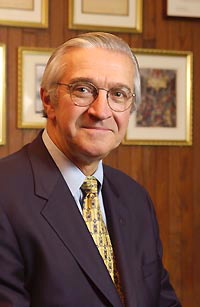|
This is an archived article.
For the latest news, go to the
Advance Homepage For more archives, go to the Advance Archive/Search Page. | ||
The Health Center's continuing recovery will require courage and determination, as well as all our collective skills. A few days ago, I was given a news article that appeared on the front page of the Philadelphia Inquirer. It was a particularly noteworthy piece.
The headline, "Penn system is recovering much faster than expected," certainly got my attention. The first sentence, however, was most notable: "In a dramatic turnaround of one of the nation's most troubled medical chains, the University of Pennsylvania Health System slashed its annual operating loss by $168 million last year and is expected to return to profitability in the current year." The article went on at great length to describe the impressive financial recovery at the four-hospital system. And while the Penn system is still operating in the red, what it's management has accomplished thus far is a testament to their courage, their willingness to change and their commitment to maintaining and augmenting the system's recognized excellence. It wasn't long ago that Penn's troubles earned them the unenviable position of being the so-called poster child for academic medical centers in financial crisis. Now they stand as an example of what can happen when faculty and staff work hand-in-hand for the betterment of the institution. I applaud Penn's accomplishment, not just for what it means to the delivery of health care in the greater Philadelphia region, but even more for what it says about the nation's academic medical centers and what they can rapidly do when seriously challenged. To put it mildly, Penn fought back. They decided early on to change, to get tough with themselves and to deal head-on with the pain. The result of this hard work means that Penn is better able to produce the societal good expected of it and all academic medical centers: relevant, high quality education, biomedical research and clinical care. Do I see meaningful comparisons between Penn's experience and the challenges facing us at the University of Connecticut Health Center? I answer that question with a resounding, "Yes." We have come quite a distance in the past 12 months. This time last year, the Health Center was experiencing monthly losses of nearly $2 million. We made some difficult and unpopular decisions in order to strengthen our financial situation and ended the fiscal year in June with a $12.2 annual deficit, before the application of a $12.5 million special appropriation from the General Assembly. We have done a credible job over the past year, although - unlike Penn - I am not yet ready to use the term, "turnaround" when describing our status. I believe the darkest days are behind us, but there is much, much more for us to do. We will need to remain uncommonly vigilant in enhancing our revenues and controlling expenses, a challenge you can expect to hear from me for quite some time. I would hope that by now you are aware of the strategic plan developed at the Health Center earlier this year and the identification of our four Signature programs: Genetics/Immunology and Cancer; Brain and Human Behavior; Bone Biology and Musculoskeletal Disease; and Connecticut Health. I am exceptionally encouraged by the initial response I've received from within the Health Center and the University, as well as from interested outside observers. Equally impressive is the energy and thinking of the teams charged with launching our Signature programs. Each team has prepared an initial business plan that will be reviewed and refined this fall. Once in place, these plans will serve as the blueprint for each Signature program, driving recruitment as well as program development and marketing. You will be hearing more about these plans in the weeks and months ahead. As our Signature programs are activated, we must not lose sight of their ultimate purpose: to build a stronger Health Center by closely linking areas of research excellence with clinical excellence. In doing so, we will strengthen more than our own institution. I'll say here what I've said so often this past year. A stronger Health Center, grounded in superb education and research, will create better healthcare in our region and state. A well regarded academic medical center attracts quality physicians not only to itself, but also to nearby hospitals where its students and residents continue to learn. Physicians know that care is heightened in an atmosphere stimulated by inquiry and investigation. The Penn system's turnaround of the past year gives us in academic medicine a reason for cautious optimism. That system was in deep financial trouble and now it stands on much more solid ground - a tribute to the administration's business acumen during this era of diminishing reimbursements. We at the Health Center should certainly share in this optimism, tempered though it is. Do we as an organization possess what it takes to ultimately succeed? I believe we do, but we know that our collective intelligence alone will not see us through to the day when the term "turnaround" applies to us. As Penn has shown, it also takes bolus doses of determination, fortitude and courage. Be peaceful. Peter J. Deckers is dean of the School of Medicine and interim chancellor of the UConn Health Center. He holds the Murray-Heilig Chair in Surgery. |

